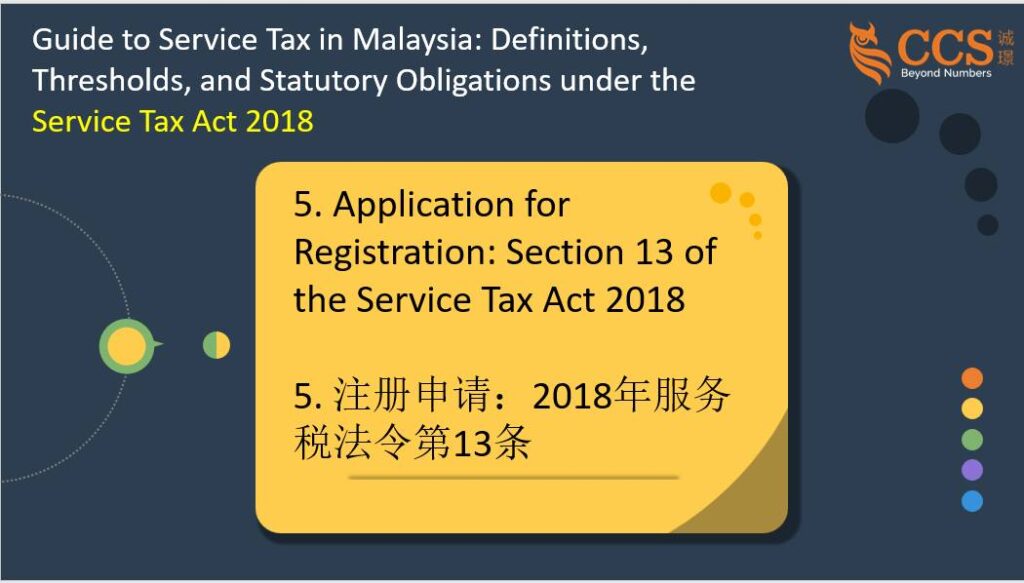
Application for Registration: Section 13 of the Service Tax Act 2018
Section 13 of the Service Tax Act 2018 meticulously outlines the procedural requirements for a person to apply for registration as a taxable person once they become liable under the provisions of Section 12.
5.1 Interpretation of Section 13(1): Obligation to Apply and Deadlines
Any person who becomes liable to be registered under Section 12 is legally obligated to submit an application to the Director General for registration as a registered person.
This application must be submitted in the prescribed form and adhere to a strict deadline: it must be filed no later than the last day of the month following the month in which the person became liable to be registered.
This deadline applies irrespective of whether the liability arose from the retrospective, prospective, or immediate commencement triggers specified in Section 12.
5.2 Detailed Explanation of Section 13(2): Director General’s Approval and Conditions
Upon receiving a complete and duly submitted application under subsection (1), the Director General possesses the authority to approve the registration.
A crucial aspect of this provision is that the Director General may impose “any conditions they deem fit” for the approval of the registration.
These conditions offer significant flexibility to the regulatory body, allowing for requirements to be tailored to specific business models, industry practices, or identified compliance risks.
This ensures that compliance can be achieved without imposing undue burdens where possible, while simultaneously maintaining effective control and oversight over the tax base.
The Director General’s power to impose conditions on registration suggests a flexible regulatory approach that can tailor requirements to specific business models or industries.
This aims to ensure compliance without undue burden where possible, while also maintaining effective control and oversight.
This flexibility moves beyond a rigid, one-size-fits-all approach, enabling the authorities to address unique challenges and risks associated with diverse service providers, thereby enhancing the overall effectiveness of the tax system.
5.3 Analysis of Section 13(3): Effective Date of Registration
Section 13(3) mandates that the Director General must register the person with effect from the first day of the month immediately following the month in which the application for registration is made.
However, the Act also provides a degree of flexibility: an earlier effective date may be mutually agreed upon between the Director General and the applicant, provided that this agreed-upon date is not earlier than the date the person originally became liable to be registered under Section 12.
This provision accommodates situations where a business might proactively seek to register earlier than the standard timeframe.
5.4 Understanding Section 13(4) & 13(5): Consequences and Offence for Non-Compliance
- Director General’s Action (Subsection 13(4)): If any person fails to comply with the fundamental obligation to apply for registration under subsection (1), the Director General retains the authority to proceed with the registration of that person.
In such instances, the Director General will unilaterally determine the effective date of registration, which cannot be earlier than the date the person originally became liable to be registered under Section 12.
This ensures that liability is not evaded through non-action. - Offence (Subsection 13(5)): Any person who fails to comply with subsection (1)—that is, fails to apply for registration when legally liable—commits an offence under the Act.
This provision carries potential penalties, including substantial fines and/or imprisonment, as further detailed in the general penalty provisions of the Service Tax Act 2018.
The explicit timeline for application and the consequence of the Director General registering a non-compliant person, coupled with the designation of non-compliance as an offense, underscore a strict enforcement regime.
This framework pushes businesses towards proactive compliance rather than reactive discovery, significantly increasing the stakes for non-adherence.
Section 13(1) sets a clear and relatively short deadline for application. The subsequent subsections (13(4) and 13(5)) act as powerful enforcement mechanisms.
If a business fails to meet the deadline, the Director General retains the power to register them anyway, ensuring they eventually enter the tax net.
More critically, this failure constitutes a legal “offence”, which carries severe penalties.
This combination creates a strong imperative for businesses to self-initiate registration promptly, as delaying or avoiding it will not only lead to eventual mandatory registration but also expose them to significant legal and financial repercussions.
5.5 Note on Section 13(6) (as per Service Tax (Amendment) Act 2019) regarding foreign service providers
Section 13 of the principal Act was amended by the Service Tax (Amendment) Act 2019 to incorporate subsection (6), which explicitly states: “This section shall not apply to a foreign service provider.”
The explicit exclusion of foreign service providers from Section 13 indicates a separate, distinct registration framework tailored specifically for them.
This reflects the unique challenges inherent in taxing cross-border digital services and ensures that appropriate mechanisms are in place for international compliance.
The definition of “foreign service provider” relates to persons outside Malaysia who provide digital services to Malaysian consumers.
By excluding them from Section 13, the Act acknowledges that the traditional registration process, primarily designed for local businesses with a physical presence, may not be suitable for such entities.
This implies that foreign digital service providers are subject to a different, likely more streamlined or specifically designed registration process, such as those outlined in the Service Tax (Digital Service) Regulations 2019.
This legislative carve-out is crucial for effectively taxing the digital economy and ensuring that foreign entities contributing to the Malaysian consumption base are brought into the tax system.
5. 注册申请:2018年服务税法第13条
2018年服务税法第13条详细规定了任何人在符合第12条规定成为应税人后,申请注册为应税人的程序要求。
5.1 第13(1)条的解释:申请义务及截止日期
任何根据第12条规定应履行注册义务的人,均有法律义务向总局长提交注册申请,以成为注册纳税人。
该申请必须采用规定的格式提交,并严格遵守截止日期:必须在成为注册义务人的当月次月最后一天之前提交。
该截止日期适用于第12条规定的任何触发注册义务的情形,包括溯及既往、前瞻性或立即生效的情形。
5.2 第13(2)条的详细说明:总监的批准及条件
总监在收到符合第(1)款规定的完整且有效提交的申请后,有权批准注册。
本条款的关键在于,总监可为批准注册设定“其认为适当的任何条件”。
这些条件为监管机构提供了显著的灵活性,使其能够根据特定商业模式、行业惯例或识别出的合规风险定制要求。
这确保在可能的情况下实现合规而不造成不必要的负担,同时保持对税基的有效控制和监督。
总监对注册设定条件的权力表明了一种灵活的监管方法,可根据特定商业模式或行业需求定制要求。
此举旨在在可能的情况下确保合规性而不造成不必要的负担,同时保持对税基的有效控制和监督。
这种灵活性超越了僵化的、一刀切的监管模式,使当局能够应对多元化服务提供商带来的独特挑战和风险,从而提升税收体系的整体效能。
5.3 第13(3)条分析:注册生效日期
第13(3)条规定,总监必须自注册申请提交当月次月第一日起对申请人进行注册。
然而,该法也提供了一定灵活性:总监与申请人可协商确定更早的生效日期,但该日期不得早于该人根据第12条首次应注册的日期。
此规定适用于企业主动寻求在标准时限前注册的情形。
5.4 理解第13(4)及13(5)条:未遵守规定的后果及违法行为
- 总监采取的行动(第13(4)款):若任何人未履行根据第(1)款申请注册的基本义务,总监有权继续对该人进行注册。
在此类情况下,总监将单方面确定注册的生效日期,该日期不得早于该人根据第12条首次应履行注册义务的日期。
此规定确保通过不作为逃避责任。 - 违法行为(第13(5)款):任何未遵守第(1)款规定——即在依法应履行义务时未申请注册——的人员,构成违反本法规定的违法行为。
本条款规定了潜在处罚,包括巨额罚款和/或监禁,具体细节详见《2018年服务税法》的一般处罚条款。
明确的申请时限、总监对未遵守规定者进行登记的后果,以及将未遵守规定指定为犯罪行为,共同凸显了严格的执法制度。
该框架促使企业主动遵守规定而非被动发现,显著提高了不遵守规定的风险。
第13(1)款设定了明确且相对较短的申请时限。随后的第13(4)和13(5)款作为强大的执法机制。
若企业未能在截止日期前完成注册,总监仍可强制注册,确保其最终纳入税收体系。
更关键的是,此类违规行为构成法律上的“犯罪”,将面临严厉处罚。
这种组合形成了企业必须及时主动注册的强烈迫切性,因为拖延或规避注册不仅会导致最终强制注册,还会使企业面临重大法律和财务后果。
5.5 关于第13(6)条(根据2019年服务税(修订)法)的说明,涉及外国服务提供商
《服务税法》第13条经《2019年服务税(修订)法》修订,新增第(6)款,明确规定:“本条不适用于外国服务提供商。”
第13条明确排除外国服务提供商,表明为其建立了独立的注册框架。
这反映了对跨境数字服务征税所面临的独特挑战,并确保了国际合规的适当机制到位。
“外国服务提供商”的定义指的是向马来西亚消费者提供数字服务的马来西亚境外人员。
通过将他们排除在第13条之外,该法案承认传统的注册流程(主要针对在马来西亚有实体存在的地方企业)可能不适用于此类实体。
这意味着外国数字服务提供商需遵循不同的注册流程,该流程可能更为简化或专门设计,例如《2019年服务税(数字服务)条例》中规定的流程。
这一立法豁免条款对于有效征税数字经济至关重要,确保为马来西亚消费基础做出贡献的外国实体纳入税收体系。
#看趋势看财税看CCS






